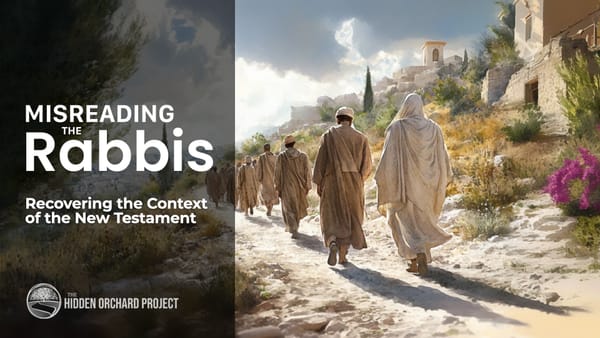Soul Refinement - Guarding Our Speech
To the best of my knowledge, no legal system on earth holds verbal insults and thought crimes in the same category as more egregious and obvious crimes like murder and adultery. However, in the spiritual economy of the Bible, these are very much connected.

To the best of my knowledge, no legal system on earth holds verbal insults and thought crimes in the same category as more egregious crimes like murder and adultery.
However, in the spiritual economy of the Bible, these are very much connected - but in a way that is perhaps not so apparent. A large part of this reason is related to spiritual impurity.
This principle is reinforced throughout the Hebrew Bible and carried throughout the New Testament. The lesson is the same - we must all be vigilant and determined to develop and guard our spiritual purity.
We covered some key Mussar concepts in a video series¹ a few months ago. We looked at how our imbalanced character traits like arrogance, anger, and evil speech can be incredibly damaging to a person's spiritual state, negatively impacting their entire community.
The Sages tell us that evil speech and baseless hatred caused the destruction of the Second Temple and prolonged the exile that we are still enduring. Rabbi Chaim Vital makes an unsettling statement in the work, "Gates of Holiness"
"Negative character traits are actually much worse than the transgressions themselves…"
He goes on to explain that unrectified character traits remain an ever-present evil in our system, influencing our thoughts, words, and deeds. Among the most damaging, and the most prolific is the abuse of speech.
Rectifying Our Speech
As important as this topic is, until the late 1800's, no work focused on simplifying how one might begin to guard their speech. In the 1870s, Rabbi Meir Kagan² produced his classic work, "The Chafetz Chaim"³.
In this work, he details the qualifying categories and examples of evil speech and various strategies to avoid it. In this work, we learn about the dangers of gossip, slander, and lies - the prominent categories. He also elaborates upon violations that may fly under most of our radars.
Evil speech that is true
For example, he teaches that evil speech is not always deceptive. Even if what we are saying is 100% true, but will cast someone in a negative light, then we are not permitted to speak it publicly. What makes this extra dangerous is that we naturally inculcate a listener into the equation, causing them to sin. This could be counted as a violation of the prohibition against 'stumbling' others.
Embarrassing others
Further, saying something that could potentially embarrass someone else is not permitted. Even if they embarrassed you first, your best recourse is to let it go and not share it with others. In another article, we explored the tremendous blessing that comes from ignoring an insult⁴.
Arguments
Another example is entertaining arguments. Though potentially intended for good, an argument could put both sides at risk of many other violations, such as; anger, more evil speech, misrepresenting information, arguing from a place of ego, embarrassing others, arrogance, and much more.
This is why the Sages warn that we should always ensure our arguments are "for the sake of Heaven" and there is mutual openness to learning. If indeed we are arguing with someone who is only looking to argue, it is a mitzvah to keep silent and not engage. This idea can be found in Rabbinic literature and the Gospels⁵.
Listening to Evil Speech
As we mentioned above, an often-forgotten component of our speech includes the listener. The Torah forbids us from believing and sharing evil speech. If we speak Lashon Hara (evil speech) to someone who listens and spreads it - the results of these are doubly credited to the speaker.
Consider a friend telling you that their boss is a 'jerk.' You are only hearing one side of the story. Imagine how your posture might reflect a pre-determined opinion of them if you were to ever meet them. Though you are loyal to your friend, you must be careful not to let that perspective cause you to judge someone negatively, particularly if you've never met them.
Judging Others Favorably
The Chafetz Chaim shares a tip to avoid a significant amount of Lashon Hara. It is simply to Judge others favorably, in Hebrew, Dan L'Kaf Zechut. This topic is covered in this article⁶.
In short, if we assume the best of someone or can give them the benefit of the doubt, we are less likely to speak ill of them.
Consider, that you are on the way to work and someone speeds past you. Instead of assuming the worst, and muttering "Idiot!" under your breath. Instead, give them the benefit of the doubt. Maybe they are late to work or are on the way to the hospital to visit a loved one. Even if this is not the case, it is less likely that you will think negatively of them and cause damage to yourself in the process. Let it go.
For now, let us consider these ideas and plan to improve how we use our gift of speech. Little by little, we can make progress, and Heaven will help us if we try.
If you are interested in beginning today, consider purchasing the following book, a Daily Companion to the Chafetz Chaim. It is accessible and easy to digest, providing daily insights to work on.
Notes:
¹ https://www.youtube.com/watch?v=2suJNTwGv7Y&list=PLIu16isWs81mOYE9c50ukeb8621AQmgYI
² https://torah.org/learning/halashon-ccbio/
³ The Chafetz Chaim https://a.co/d/951aCDJ
⁴ https://www.thehiddenorchard.com/accepting-insults/
⁵ Jer. Talmud, Avodah Zara 41d; Matthew 7:6
https://www.thehiddenorchard.com/soul-refinement-judging-others-favorably/





